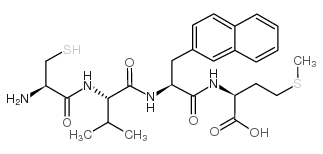| 结构式 | 名称/CAS号 | 全部文献 |
|---|---|---|
 |
H-CYS-VAL-2-NAL-MET-OH
CAS:158022-12-9 |
| 结构式 | 名称/CAS号 | 全部文献 |
|---|---|---|
 |
H-CYS-VAL-2-NAL-MET-OH
CAS:158022-12-9 |